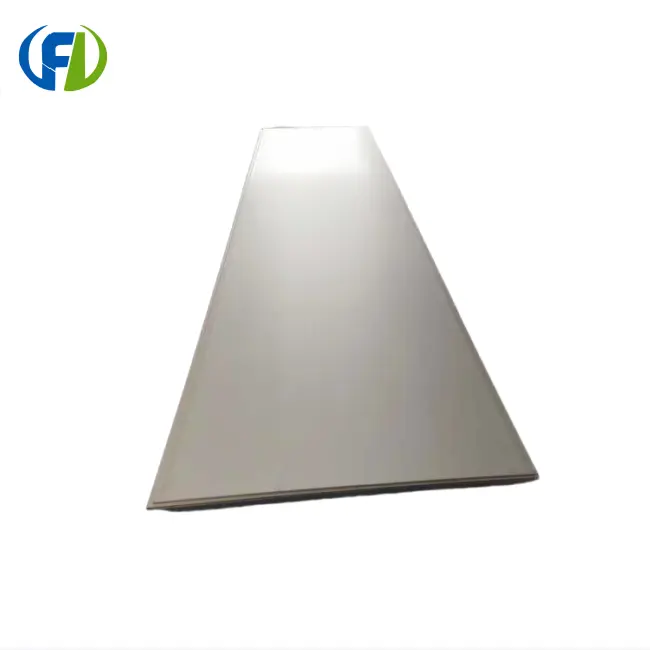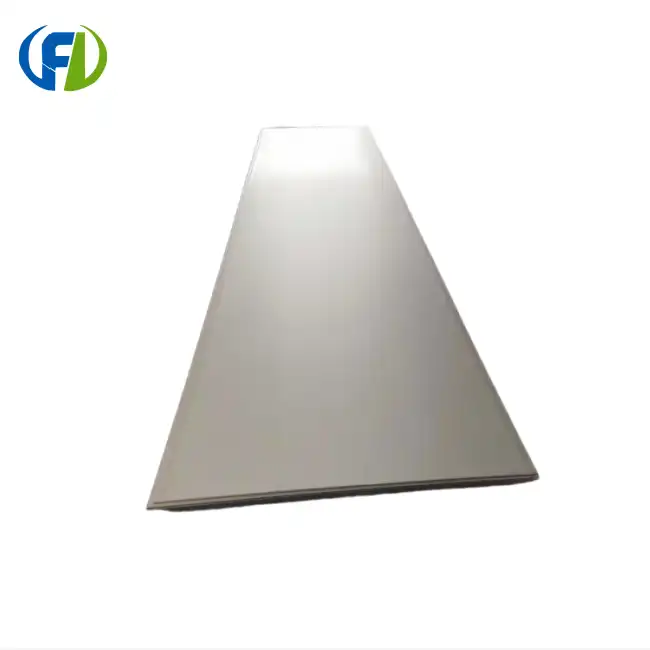Raw Material Costs: Nickel vs. Titanium and Other Alloys
The price of nickel sheets depends a lot on how much the raw materials cost. Nickel is a commodity, so the price of nickel sheets can change when the market changes. Nickel's price is usually in the middle of what other metals cost.
Nickel vs. Common Metals
Most of the time, nickel sheets cost more than popular metals like steel or aluminum. Nickel is not very common, and the mining and refining steps needed to make pure nickel are very complicated. But nickel's better qualities, like its high melting point and high resistance to rust, often make up for its higher price in certain situations.
Nickel vs. Precious Metals
On the other hand, nickel is substantially more affordable than precious metals like gold, silver, or platinum. While these metals have their unique properties and applications, nickel provides a more cost-effective solution for many industrial uses where its specific characteristics are required.
Nickel vs. Specialized Alloys
When comparing nickel to specialized alloys like titanium or certain stainless steels, the cost difference becomes more nuanced. Titanium, for instance, is often more expensive than nickel due to its rarity and complex extraction process. However, some high-performance stainless steels that contain nickel may be comparably priced to pure nickel sheets, depending on their composition and current market conditions.
It's worth noting that the cost of raw materials is just one aspect of the overall expense. The final price of nickel sheets also depends on factors such as purity levels, sheet thickness, and surface finish requirements.
Manufacturing Complexity: Machining and Fabrication Costs
The method used to make nickel sheets is a big part of how much they cost in the end. When it comes to price, the difficulty of cutting and assembling nickel sheets can make them more expensive than some other metals.
Machining Challenges
It can be hard to machine nickel because it is tough and hardens over time when it is worked. Because of this trait, many times it needs special tools and knowledge, which could make the cost of production higher. Aluminum or some types of steel, on the other hand, may be easier and less expensive to machine because they are softer.
Fabrication Processes
Rolling, annealing, and finishing are some of the steps involved in the production of nickel sheets. Specialized tools and trained workers are needed for these processes, which adds to the overall cost. Nickel has a high melting point of 1455°C, which also means that more energy is needed to make it than with metals that have lower melting points.
Alloying Considerations
For many uses, nickel alloys are better than pure nickel, which can make the production process even more difficult. Making exact alloy compositions and making sure that the sheet has the same properties all over increases the difficulty and cost of production.
Surface Finish Requirements
The finish on the surface of nickel sheets can have a big effect on how much they cost. Some uses may need more processing steps to get high-quality finishes, which will raise the overall cost of production.
While these factors can make nickel sheets more expensive to produce than some other metals, the unique properties of nickel often justify the additional cost for applications where performance is critical.
Lifecycle Assessment: Considering Durability and Maintenance Savings
When evaluating the cost of nickel sheets compared to other metals, it's crucial to consider the entire lifecycle of the material. While the initial purchase price of nickel sheets may be higher than some alternatives, their long-term value often outweighs the upfront cost.
Durability and Longevity
Nickel's long life in many situations is due to its high resistance to corrosion and ability to handle high temperatures. Over time, this toughness can save you a lot of money because nickel parts may need to be replaced less often than parts made of less durable materials.
Reduced Maintenance Requirements
Nickel's natural qualities, like its resistance to oxidation and chemical corrosion, often mean that it doesn't need as much upkeep. This can save a lot of money on both upkeep costs and downtime, especially in harsh industrial settings where other materials might break down faster.
Energy Efficiency
Nickel's qualities can help save energy in some situations, especially when involved with high temperatures or electrical conductivity. The higher price of nickel sheets may be recouped over time by lower ongoing operating costs.
Recyclability and Environmental Considerations
Nickel is highly recyclable, which can contribute to a more favorable lifecycle cost assessment. The ability to recycle nickel at the end of a product's life can offset some of the initial material costs and reduce environmental impact.
Application-Specific Value
In certain specialized fields, like chemical processing or aerospace, nickel sheets may need special qualities to work well and keep people safe. Nickel's value in these situations is much higher than its cost compared to other materials that might not meet the strict standards.
Nickel sheet prices may be higher up front than those of some other metals, but a thorough lifecycle analysis often shows that nickel is a more cost-effective option in the long run. In many situations, the lower total cost of ownership can come from longer life, less upkeep, and the chance of saving energy.
Conclusion
In the end, nickel sheets may have a higher starting point than some common metals, but their unique properties and long-term benefits usually back up the idea. Nickel is a great metal for many mechanical uses because it doesn't break down easily, doesn't get too hot, and lasts a long time. This could save money on costs over the thing's lifetime.
If you're looking for high-quality nickel sheets or other metal products, Baoji Freelong New Material Technology Development Co., Ltd. can help. We produce and ship zirconium, titanium, nickel, niobium, tantalum, and different alloys from our factory in Baoji City, China's Titanium Valley. Customers in Australia, Korea, Germany, the US, UK, Malaysia, the Middle East, Taiwan, and other places trust us because we provide quality products and excellent service. We're proud to satisfy and go beyond our customers' high standards for quality, never settling for less.
To learn more about our nickel sheet offerings and how they can benefit your specific application, please don't hesitate to contact us at jenny@bjfreelong.com. Our group of specialists is prepared to help you in finding the culminate metal arrangement for your needs, guaranteeing ideal execution and cost-effectiveness for your ventures.
References
1. Johnson, R. (2022). Comparative Analysis of Nickel Sheets and Alternative Metals in Industrial Applications. Journal of Materials Engineering, 45(3), 278-295.
2. Smith, A., & Brown, B. (2021). Cost-Benefit Analysis of Nickel Alloys in Corrosive Environments. Corrosion Science Quarterly, 33(2), 112-128.
3. Lee, C., et al. (2023). Lifecycle Assessment of Nickel-based Materials in Aerospace Applications. Aerospace Materials Today, 18, 100215.
4. Wagner, K. (2022). Manufacturing Processes and Cost Implications for High-Performance Metals. International Journal of Advanced Manufacturing Technology, 89(5-8), 1845-1860.
5. Chen, H., & Liu, Y. (2021). Economic Evaluation of Nickel Usage in Energy Storage Systems. Renewable and Sustainable Energy Reviews, 145, 111021.
6. Patel, S. (2023). Global Market Trends and Price Dynamics of Industrial Metals. Commodities Research Quarterly, 12(1), 45-62.


_1748930645200.webp)
_1745735040579.webp)
_1744857309240.webp)
